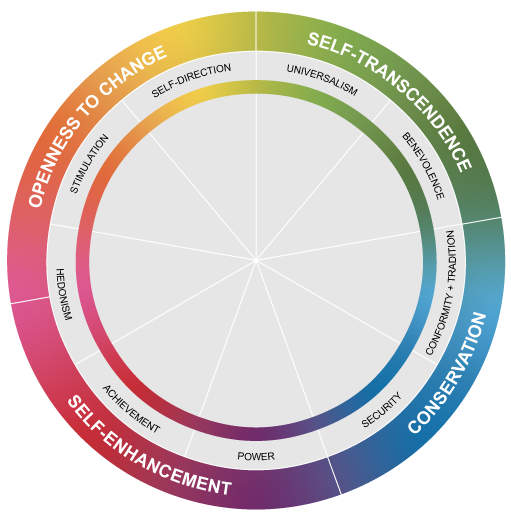Shalom SCHWARTZ
The values framework was developed by Shalom H. Shwartz to measure how different cultures prioritize their values. 10 universal values were identified. Values are the things that are most important to us. Whether it is security, connection, ambition etc. These values are usually expressed in ends based terms such as ‘career’ which supports a security value. Each person and each group of people have a unique values blueprint. But values are usually subconscious which means that the power of values as a motivator and a guide for your personal and professional life may be untapped. It is especially important for building ethical businesses because moral values is the driving force of ethical strategy and conduct.

10 Universal Values
The 10 universal values featured in this Personal Values Test are:
Self-direction
this includes establishing and developing
one’s own life path.
Universalism
environment constitute the essence and the
core motivation that drives their behaviour.
Stimulation
involves the search for excitement and vivid sensations in life.
Hedonism
the main motivational goal is to enjoy life’s goals and events.
Achievement
involves the positive result of work and activities and the success associated with the evaluation of these results as outstanding.

Benevolence
this includes safeguarding and aiding people with whom one is in close contact.
Tradition
keeping to the historically established customs, norms of behaviour, attitudes, beliefs, etc., that are passed on from generation to generation.
Conformity
means a conscious limitation of one’s desires, emotions and impulsive actions that can harm or hurt other people.
Power
t implies the right and ability to have power
over other people or resources.
Safety
for a sense of harmony and security in society,
oneself and others.
Other personality and organisational profiling
which complements the Shwartz Values framework including:

HEXACO Personality
The HEXACO personality profile is an advancement of the Big Five personality test because it includes a sixth trait (Honesty-Humility). The other dimensions assessed include emotionality, eXtraversion, agreeableness, conscientiousness and openness to experience.

Strengths Assessment

